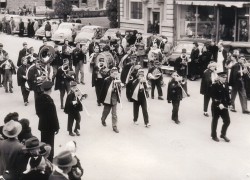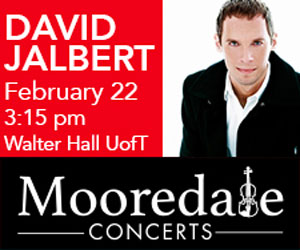With spring just around the corner, many community bands, even while still in the midst of rehearsals for spring concerts, are already contemplating and even planning for various special events during the summer months. What form will these take? And how will they differ from the events such bands participated in 50, 75 or 100 years ago? Will the same types of events that attracted audiences in those days be of interest in the year 2012?
 When I first started playing in a band, we were almost overwhelmed with the number of summer events. My summers were filled with out-of-town band tattoos every weekend, frequent parades, occasional competitions and finally the trip to Toronto for the annual competitions at the Canadian National Exhibition. It was almost as busy for the adult bands. However, times have changed.
When I first started playing in a band, we were almost overwhelmed with the number of summer events. My summers were filled with out-of-town band tattoos every weekend, frequent parades, occasional competitions and finally the trip to Toronto for the annual competitions at the Canadian National Exhibition. It was almost as busy for the adult bands. However, times have changed.
Five years ago in this column I stated that one of my hobby horses was to foster the recognition of bands in this part of the world as serious musical organizations. At that time, I quoted an author of an article on bands published about 20 years ago. In it, the author refers to “the Golden Age of band music that flourished during the last decades of the 19th century and the first decades of the 20th.” In a later paragraph, this expert states an unequivocal fact: “As we all know, the original town band fervour has since gone the way of vaudeville and other populist art forms.”
True, bands and their activities have evolved, but town bands certainly have not gone as that author suggests. Just as the society we live in is constantly changing, so has the role of the town band. I would say that the primary role of these bands now is to provide a regular recreational outlet for those who love to make music, but not in isolation. They want an audience, and not just to pay a part of their expenses. Much of the satisfaction comes from performing for an appreciative audience. What is the magic formula? Bands don’t have the resources to get involved in sophisticated market research, but they still would like to know what will attract an audience and fill the seats.
Having taught marketing, and having been employed as manager of marketing communication for the Canadian subsidiary of a large multinational corporation, I would like to suggest some fundamental principles of marketing when planning a band’s special event. A standard starting point is defining “your goals, your product and your market.”
Your Goals: Define your goals for the event and the longer term goals for the band. In my opinion there might well be four stated goals. The first is the somewhat obvious wish to make music with like-minded friends. The second, equally obvious, is to entertain an appreciative audience. A third goal would be to acquaint the community with the band’s record over the years and to make all citizens more aware of the band’s potential to continue and to expand its role in the life of the community. The final, all-important goal would be to make everyone in town, especially the town council, aware of the band’s desire to have a home that they can call their own. Many bands rehearse in schools, and while they are grateful for the use of this rehearsal space, there are usually significant limitations in size, storage space and accessibility outside of rehearsal hours. There are a few notable exceptions to this last situation, reported on after a visit a couple of years ago: the Cobourg Concert Band and the Oshawa Civic Band have excellent homes of their own with great support from their communities.
Your Product: What are you selling? Is it concert entertainment, an outlet for persons of all ages to hone their musical talents with like-minded friends, or what? When the band was established and, hopefully, recognized by the town, what was its product then? If the band is over 100 years old, it probably started out as a major source of musical entertainment for the townsfolk. There was no radio, television, movies or records, let alone the plethora of portable music sources of the present day. If it started 75 years ago, there were probably still tattoos, but there would have been some competition from movies and a bit from radio. If 50 years ago, television was in the entertainment picture, with fewer channels than now, but in full force. What about the product in 2012 and beyond? The one attribute of the community band that has remained constant, is its ability to provide an outlet for the personal satisfaction of performing for an audience. What does your community band have to offer to its community in 2012, and in the years ahead?
Your Market: Define your market and your niche in that market. Remember that the role of the town band has changed drastically in the past 150 years — yes, there are town bands who can claim their service to the community for that long. We must recognize that “the town band” is no longer a principal source of musical entertainment in the town. For that matter, the “town,” in most cases, is no longer a town in the same sense it used to be. It may well be a city on its own. But for many of the populace, their town may be a bedroom community. They are employed elsewhere, and spend a significant portion of their time away from “the town.” Above all, recognize that the municipal council and the various funding organizations under its aegis are crucial components of your market. You must cultivate and nourish their perception of the band as a valued organization and an asset to the entire community. In most cases, without their support, the band’s very existence could be in jeopardy.
Proceed cautiously, you have time over the coming months to plan your events. Don’t commit to details in haste only to repent at leisure after the event. Consider your plans carefully and in meticulous detail so that you will be able to bask in the glow of a job well done next fall. Now for the big question: Who in the band will be doing the planning for these special events? Think about it.
For an example of a really worthwhile, well thought-out programme, take a look at the offering of London’s Plumbing Factory Brass Band for their March concert. It’s nothing but marches, but with nary a parade march among them. See “Beyond the GTA” listings for March 28.
As for new developments on the band front, we have just learned of the establishment of a new community band in Aurora. They rehearse on Sunday evenings. More details to come. As for the New Horizons music camp in July at Brock University, which was mentioned last month, it is now booked to capacity and has applicants on a waiting list.
Finally, a refreshing comment from a fellow musician. In a recent chat with jazz guitarist Gerry Mackay (who, by the way, has a regular solo jazz guitar gig at 8pm every Friday at Whitlock’s Restaurant & Wine Café Bar, 1961 Queen St. E.), he summed up his philosophy of performance quite simply: “Take your audience on a journey.” That should work well for the planning of any concert.
Definition Department
This month’s lesser-known musical term is Scrambelissimo: Do the best you can with this difficult section.
We invite submissions from readers. Let’s hear your daffynitions.
Coming Events
Please see the listings section for full details.
Jack MacQuarrie plays several brass instruments and has performed in many community ensembles. He can be contacted at bandstand@thewholenote.com.



